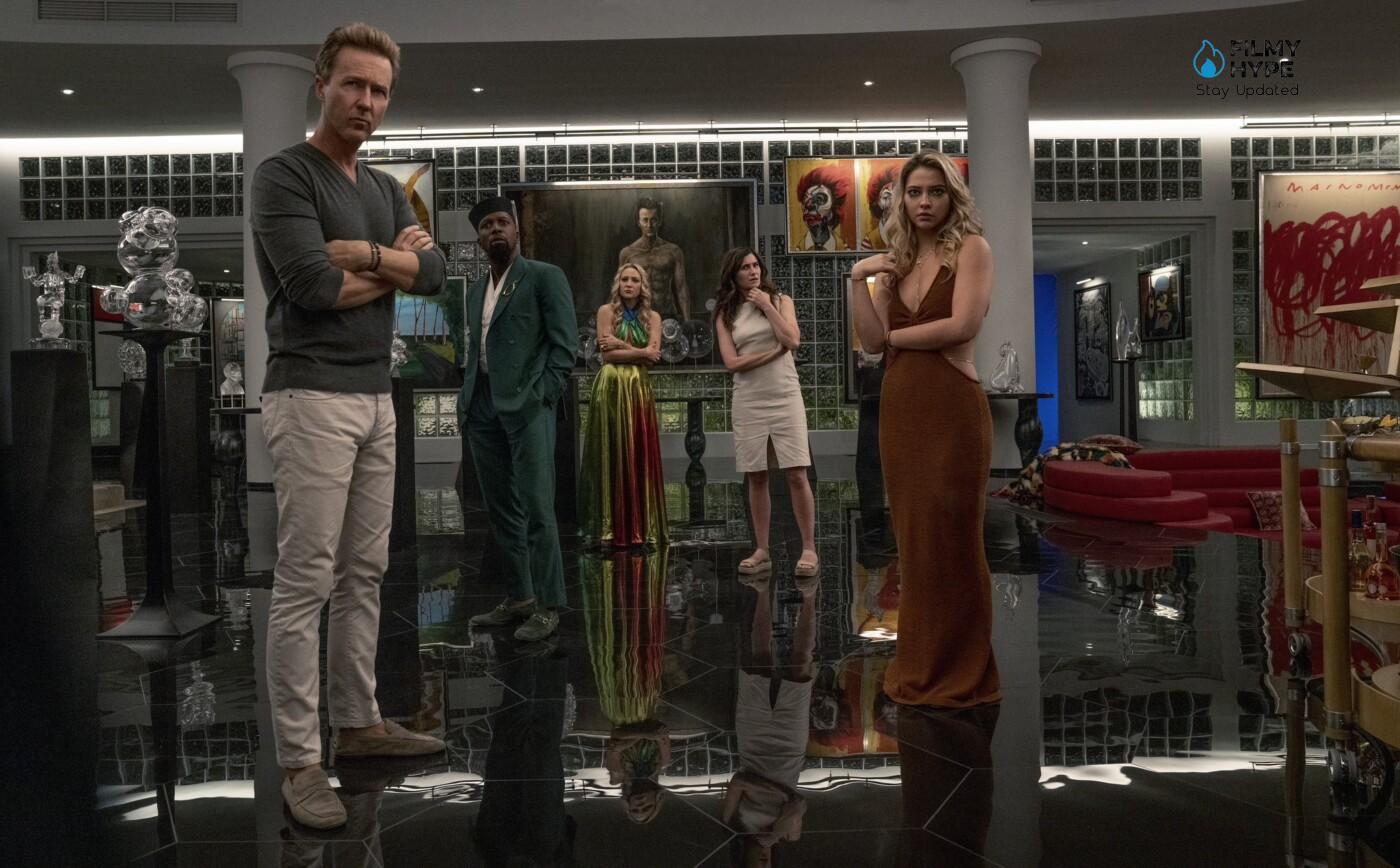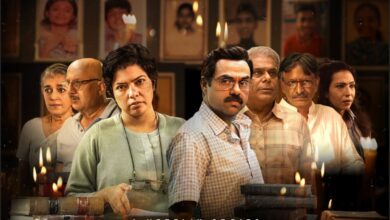Glass Onion Ending Explained: The Meaning Of The Onion? A Knives Out Mystery
The newest film on the platform, Glass Onion: A Knives Out Mystery, recently debuted in the Netflix catalog. With a star-studded cast that features Daniel Craig, Edward Norton and Janelle Monáe in the lead roles, the feature shows famous detective Benoit Blanc going to Greece to unravel a mystery involving a billionaire and his eclectic circle of friends. A sequel to the well-known Entre Knives and Secrets (Knives Out, 2019), the film admittedly raised the level of the thing, being acclaimed by both critics and spectators. And it will be the subject of this special publication in Guia de Séries, especially for those of you who had some difficulty understanding the film and its context. So, get ready for spoilers in case you haven’t watched it and let’s go to an explanation about the ending of the movie Glass Onion: A Knives Out Mystery!

In 2019, Rian Johnson paid homage to the classic yellow, a genre he is particularly fond of, by signing the film Knives Out, the debut of detective Benoit Blanc played by Daniel Craig. Three years later, partly in theaters but mostly on Netflix, Johnson and his irresistible creation are back with us with the sequel Glass Onion: A Knives Out Mystery (which we told you about in our review), which takes a slightly different approach to rework the stylistic features of the traditional Agatha Christie-style whodunit in a contemporary perspective. An approach we want to comment on in our explanation of the Glass Onion: A Knives Out Mystery ending. NB This article contains spoilers.
In the first film, the self-reflexive component was very strong, with the choice of having a famous mystery author as a victim (the delightful moment in which the writer, realizes that he is about to die of an accidental overdose because his medicine bottles have been inverted, comments “I have to write it down, it’s a great way to kill someone”). When you start like this, it is natural to ask yourself how it will be possible to go further in the sequel. And in fact, Rian Johnson doesn’t even try. Indeed, the “meta” component, if we want to call it that in this case, essentially runs out in the first half hour, in particular through the cameos of the late Stephen Sondheim, screenwriter of a film with a premise similar to that of Glass Onion, and Angela Lansbury, aka Jessica Fletcher. And that it will not be the usual intricate mystery is an element that Johnson announces from the beginning, through the title.
Glass Onion Ending Explained: How It All Began…
Right from the start, a very extensive flashback shows that Blanc’s main objective is to solve the mystery surrounding Andi’s death. The film shows that Miles ‘ former business partner opted out of the weekend trip after she was dumped from her multibillion-dollar company by him, which raises suspicions about the mogul. More than a week after the death, the woman’s twin sister Helen believes she was murdered. After looking for Blanc to talk about what happened, she realized that the best way to investigate the case would be to join Miles’ trip, posing as Andi in an attempt to catch the killer off guard to help with the investigation.

To recap the case, Andi was found dead in a likely suicide scenario several days after the Glass Onion weekend, right after she lost her legal battle with Miles in court to prove she was responsible for the initial idea. from the bar. She began to move away from Alpha and to keep half of the company so as not to waste more resources on Klear, a fuel that proved to be quite unstable. In retaliation, Miles excluded it from legal ownership and argued in court that he was the one who wrote the original idea on a napkin years ago. With witnesses, he managed to make the partner lose the dispute. However, she was on the verge of proving the truth after finding the original napkin with the bar’s logo engraved on it. With the idea of using it in court, she sent an email to each of the witnesses with a picture of a red envelope containing the napkin.
The Beginning of the End
The revelation of the truth would bring down not only Miles but all the witnesses, who would be accused of lying-in court. The email was sent on the day of Andi’s death, which was visited by each of the witnesses on the night of the fateful crime. Which one was responsible for killing the young woman is what Helen and Blanc are trying to find out. However, just as they are about to solve the mystery, Andi’s twin sister is shot by someone mysterious. Blanc, meanwhile, learns that Lionel sent a copy of Andi’s email about the envelope to Miles, who was in New York at the time and headed to his biggest victim’s house. In the end, Miles didn’t use any of the witnesses to kill Andi, having done the job himself. Willing to do anything to keep his power, he drugged his former business partner and set up a scene so that the crime resembled a suicide – apparently a perfect crime.
And Duke’s Death?
Another mysterious death is that of Duke, who was courting Miles for a show and even sent Whiskey (Madelyn Cline) to seduce him. The scenario changed when he saw Mile leave Andi’s house on the day of her death, later discovering that the tycoon had some relation to what happened. Being blackmailed by the villain before dying, Miles discovered that the now rival was allergic to pineapple juice and prepared a cocktail with the drink. Thus, contrary to poisoning, as previously thought, this was the main reason for Duke’s death, which left no suspicions about the real person responsible. Blanc, in unraveling the crime, warned that nothing about the case was that complicated to understand, stating that Miles pays and manipulates smart people to do his job so that he gets the credit. He was even responsible for shooting Helen when he found out that her secret about her evil was in danger again.
A Return to the Present
Returning to the current story, after the flashback, we find out that Helen is alive, as the bullet hit Andi’s diary that was in her pocket. However, they decided to fake a death with Jeremy Renner’s hot sauce to buy time to search and thoroughly search Miles’ office. There, they find the Glass Onion Bar napkin that was hidden, but when revealing it to the group, Hellen sees Miles burning it with a huge lighter. Blanc, in turn, cannot help his partner, remembering that he is limited by the law, and leaves the place without a trace.
Disgusted with Miles, Helen starts to break all his glass statues, but a real revolution starts from there. It’s just that Miles’s sycophants and witnesses finally come to their senses, let out the tycoon’s anger and free themselves from dependence on him, starting to break the statues with Helen. But Helen’s main goal is to destroy the villain’s greatest creation: the Glass Onion. With a piece of the super unstable Kear, she throws the substance into the fireplace and the bar explodes. In some inexplicable way, everyone survives this event – which leads us to the final acts of the feature.
The Perfect Ending
Helen has one more revenge to complete after she regains consciousness after the explosion. With the secret key to the proof box that protects Monalisa kept under lock and key by the tycoon, she manages to destroy the painting with the fuel, to the villain’s despair. Miles’ witnesses also turn against them and will admit the truth and some lies, pointing to the villain as responsible for the murders of Andi and Duke. It’s the perfect punishment for the tycoon, who couldn’t use his power of manipulation to get away anymore.
Glass Onion Explained: The Meaning of The Onion
In the film, the Glass Onion is the name of Miles Bron’s private island in Greece, and of the bar where the various characters met years ago. It is also a structure on the island itself, and it is by observing it that Benoit Blanc finally realizes the true meaning of the object, and with it the mystery at the heart of the film: there are many layers, but in reality, everything is transparent, in front of in our eyes. The solution is (deliberately) trivial, the reversal of what happened in the first film: in 2019, Johnson had even contemplated the option of changing the order of the credits in the various promotional materials, to screw whoever – not entirely wrongly – claims to be able to guess whom the murderer is depending on who the most famous actor is whose name appears immediately after that of the detectives.
A theoretically possible solution also for the choral cast recruited for the occasion, which made it difficult to say with certainty whether it was Michael Shannon, Chris Evans, Toni Collette, and so on, who killed Christopher Plummer. Here, since his first appearance in the film, doubts are reduced to a minimum: it is reasonable to assume that the killer is Edward Norton, one of the Hollywood villains par excellence (and, without detracting from the other excellent performers, by far the most famous of the group of suspects).

As in the progenitor, the main object of Johnson’s satirical fury is whoever got rich by mercilessly exploiting others, and for this, it was easy to guess that the killer was Miles, the billionaire on whom all the others depend on a professional level (whereas in the first episode, all the suspects being members of the same high-ranking family, they were more or less evenly matched financially). A billionaire who claims to have created himself thanks to brilliant intuitions, but who along the lines of a Donald Trump or an Elon Musk (the latter being the main term of comparison when the film was released, due to timing issues) is an incompetent whose status as a self-styled business genius is a mix of excellent self-promotion skills and – pardon the expression – butt beating.
And what Johnson said in Toronto when he presented the film as a gala event, comes to mind: when asked directly about the difficulties in writing a plot that has to be a few steps ahead of the audience, he said he doesn’t work that way, because thinking you are smarter than the viewer is detrimental to the final result. He doesn’t even try, and he says it blatantly: the glass onion misleads us, but the elements to arrive at the right conclusion were there right away. Also because the rich guy who organized everything and thought he was the smartest person on earth at the end of the day is undeniably, gloriously stupid. And the real enigma is whether his moral and financial punishment (for the juridical one we are not given to know within the film itself) will be directly proportional to his ruthless arrogance. With a shamelessly affirmative answer, imbued with fire, flames and posthumous revenge.






